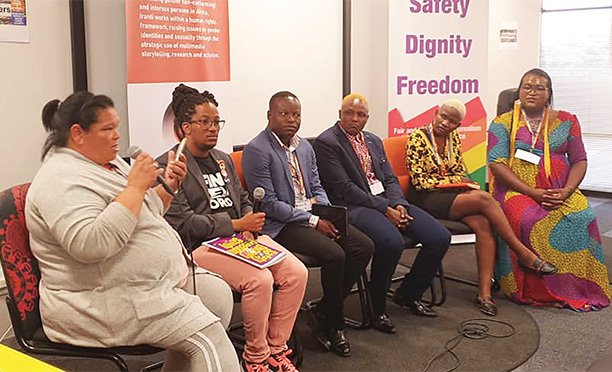Reference Guide for reporting on LGBTI issues launched in South Africa
A reference guide for media practitioners and news outlets was launched in Johannesburg, South Africa this Tuesday, intended to assist journalists and editors create media content that accurately represents the lesbian, gay, bisexual, transgender, intersex and queer people.
This follows months of research and study into how mainstream media in five Southern African countries of Botswana, South Africa, Malawi, Zimbabwe and Namibia have been presenting stories on LGBTIQ+ issues.
The 24-page guide produced and published by Iranti, a South Africa-based LGBTIQ+ advocacy organisation, covers a range of topics that include the use of offensive and hateful language in reporting, tips for interviews as well as a glossary of LGBTQI+ specific terms that have on numerous occasions been seen to confuse journalists.
The LGBTIQ+ activists have over time decried the victimisation they suffer because of the language used by the media when reporting on their issues; and at the launch of the reference guide, they reiterated their misgivings on the perceptions formed by the twisted media reports, which eventually lead to how they end up being treated by the broader society.
Thus the Executive Director of Iranti Jabulani Pereira cautioned against the rampant sensationalist reporting that has the potential to increase marginalisation, violence and general discrimination against the LGBTIQ+ community. Conversely, he said, inclusive media coverage coupled with reporting that is cautious, fair, accurate and respectful could inspire understanding and promote respect.
In finally coming up with the media reference guide, Iranti had partnered and worked with journalists and local advocacy organisations from the 5 countries - Lesbians, Gays, Bisexuals of Botswana (LEGABIBO); Lesbian, Intersex, Transgender, and Other Extensions (LITE) in Malawi; Wings to Transcend in Namibia; Intersex South Africa (ISSA), and Transgender Research, Education, Advocacy and Training (TREAT) in Zimbabwe - to create a tool intended to end the social stigmatization of individuals, the LGBTIQ+ community and the perpetuation of homophobia in these countries.
Also launched on the day - both these with the generous funding by Swedish Federation for LGBTIQ Rights (RFSL) - was the Safety, Dignity and Freedom (SDF) study report whose main aim is to challenge homophopic and anti-queer mindsets and to change harmful behaviour that targets LGBTIQ+ people, including violence, stigma and discrimination. RFSL's Programmes Manager Katarina Stenkvist extolled the bravery and innovation of Iranti and further commended the media guide and SDF campaign project for mapping a new ground and setting the tone for new ways of telling the queer experiences.
The launch ceremony this Tuesday had brought together media representatives and advocacy personnel from the five countries who in concert agreed to the need to especially train editors on the appropriate ways of reporting on LGBTIQ+ communities. Editors and subeditors especially bore the brunt of the discontent from the queer community as reporters absolved themselves from what finally goes into the newspapers. "Most of the time we write stories in the proper language, only for editors to twist and sensationalise them for the sake of newspaper sales," one of the attendant journalist told the launch panel discussion.
Local advocacy organisations were however partly fingered for the misrepresentation as their media training programmes had only been targeting junior reporters who do not have the final say on what goes into the paper. Thus each organisation was implored to come up with awareness and training campaigns that would this time target the editing personnel in order to help them appreciate what constitutes hate speech, offensive terminology and defamatory language.
"It is important for advocacy activists to engage with the publishing house, set up meetings with editors and sub editors and show them examples of bad and good pieces of stories on queer communities and why such stories can be harmful," advised Carl Collison, an internationally-acclaimed journalist who has been hailed as a good template for how great LGBTIQ+ stories should be told. Collison was giving a keynote address at the launch and gave living examples of how inappropriate language has brought great harm to queer communities across Africa and beyond.
Such terms as 'hermaphrodite' were singled out as inappropriate, derogatory and promoting stigmatisation, with 'intersex' the more decent word to use for people classified as such.
Media personnel also learnt that it was actually offensive to use phrases such as "born female," "born male," "from man to woman," "homosexual relationship" and headlines that sexualise everything about the LGBTIQ+ community.
Information on the appropriate terms and phrases to use is included in the media reference guide. LEGABIBO's Media Advocacy and Communications Officer, Matlhogonolo Samsam acknowledged the need to step up their media campaign in Botswana to target editors as local newspapers have also been found wanting in the way they treat LGBTIQ+ stories, especially the headlines. "Sometimes the contents of the articles are fine, it is usually the headlines that are offensive as the aim is obviously to bait the reader," she told The Midweek Sun on the sidelines of the media guide launch.
"It is my hope that the media houses in Botswana will engage with the media guide, and to also note that when they report on the LGBTIQ+ people and issues, they are talking about human beings and human rights in the first place. We are more than just lesbians, gays or bisexuals; we are people's aunts, uncles, fathers and mothers. There so much to us than our sexuality and our gender identity. LEGABIBO is available at all times to help when the journalists need clarity on some issues," Samsam added.






